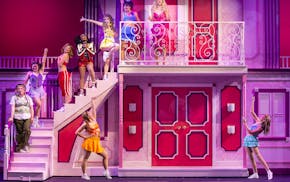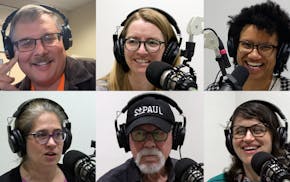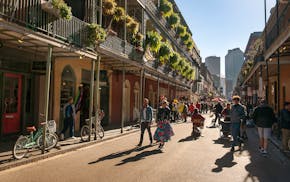You can read Minneapolis poet Danez Smith's work in two new books or, if you happen to be in New York, on subway walls.
Smith's collection of poems, "Bluff," was published by Graywolf Press earlier this year. And Smith curated the just-released "Blues in Stereo," a collection of the early poems of the great Langston Hughes, a leader of the 1920s Harlem Renaissance of writers and artists. But Smith's words are getting the most exposure via a project of the American Society of Poets that put verse on the walls of New York's transportation system.
All of Smith's work is filled with a love of the Twin Cities, where "the people who make up the fabric of my heart live." Smith, 35, feels fueled by the "electricity" of this place.
"Because I know it so intimately, Minneapolis feels most malleable to me. The rest of the world feels immovable sometimes. If we talk about changing the world, I think I could change things here if I leaned into it. I know the people to talk to," said Smith. "The frightening and very possible energy of 2020, after the murder of George Floyd, it really felt to me like the future was starting."
Smith will discuss that future and read from both "Bluff" and "Blues in Stereo" at a Nov. 19 appearance at SubText Books in St. Paul. Before that, we spoke about why Smith has been crying a lot, about leaving one lasting poem and about Hughes' legacy.
Q: Have you been pleased by the response to "Bluff?"
A: My number one hope when my work goes beyond my own desk into the world is that it's useful to people. That it helps them think, that it keeps them company, that it helps them feel seen, maybe that it helps them feel less alone. People, for some reason, feel pulled to tell me what they think and that makes me feel happy and proud of the work I'm doing.
Q: Lots of people have reached out?
A: A lot of peers and heroes have let me know what this work has meant to them. I spent a lot of August and September crying a lot because of the rush of kindness of people telling me about this book.
Q: Do you cry more when you're happy or sad?
A: Happy. My husband, I think, finally got used to it after about four years of being together. I think he's used to me crying in the kitchen because it was a really good day.
Q: When did you first encounter Hughes?
A: Probably in middle school or high school. I remember reading him in some English class during the month of February [Black History Month], when the Black people were ushered in front of us in English class and we were told about the Harlem Renaissance.
Q: When did he first make an impression?
A: The first time I remember it really sticking was after I started self-identifying as a poet in college, when a professor tasked me and a friend to remix "Harlem," the "dream deferred" poem that talks about dreams drying like "a raisin in the sun."
Q: Speaking of the Harlem Renaissance, one thing that struck me in a recent New York Times interactive was how important women, specifically lesbians, were to it. We don't always hear that.
A: The Harlem Renaissance is very much talked about with its men. There were so many women and queer folks and lines where identity was blurred. It was a close-knit, gossipy scene.
Q: You grapple with queerness in your poetry and in the Hughes collection. Does it bug you that we can't say for sure how Hughes saw his own identity?
A: I don't feel a pressure to label our ancestors with words they did not use for themselves. I feel a queerness in his work, via how lovingly and abundantly he embodies the female voice and through his poems about kinship with other male folks. Sure, there is this part that wants to find identification with a hero of mine but what I can relate to is his love for Black people.
Q: So, no need to label him?
A: Do I wish he lived in a world where he could have been loud and proud about it? Sure. Do I feel like the people who needed to know did know? Yes.
Q: Reading the Hughes poetry in "Blues in Stereo," poems he wrote when he was a young man in the 1920s, many sound like they could have been written yesterday.
A: Since caveman [days], we write about sex, we write about love, we write about war, we write about country, life and death and time. All the big things. Being human is still something we are troubling and figuring out. There is a reason we can pick up something written 50, 100 years ago and feel like we're communicating with someone who is living now.
Q: You're basically contemporaries!
A: What is an 80-year life to Earth, which is millions of years old? We are alive at the same time as Hughes. One hundred years ago, he was publishing his first book and that's nothing in the grand scale of time.
Q: Reading his early poems, did you think about your own early poems?
A: It's always Langston Hughes, "great American poet," but I was looking through the work of someone who at the time he was writing it was younger than I am now. That really mesmerized me. How was this young man, this teenager, already seeing his country and his people's position in it, their joy and struggle, so intimately and clearly?
Q: One thing we take away from "Blues in Stereo" is the incredible fact that Hughes' first poem, "The Negro Speaks of Rivers," became a classic. You describe it as "one of the most monumental works of verse in the American canon."
A: In American poetry, we like to trace ourselves as coming from Whitman or Dickinson but there is a rich tradition, by extension, that comes from Langston or maybe [enslaved poet] Phyllis Wheatley. A great mentor of mine once told me, "If you're a really great poet, they'll remember one of your poems after you die." We write book after book after book, trying to find one that really sticks.
Q: It doesn't bum you out to think that your legacy could be just one poem?
A: No! How many writers do we remember for one poem, one song, one novel? You kind of just need to write one that sticks. But you spend your life trying to write that one. I find it really beautiful.
Q: But I guess you don't know which one it is as you're writing it, whether it's in "Bluff" or in the future?
A: One thing that stands out to me is the great poet Andre 3000 from [hip-hop band] Outkast: "Baby boy, you're only as funky as your last cut" [from the song "Rosa Parks"]. Keep creating. Don't rest on your laurels. Dive deeper into your mind and into possible questions and answers in the world. That also speaks to that ephemeralness of humans. We are so brief in our lives that it's saying a lot if you can make one thing that people treasure, that is beautiful.
Q: Do you think you've written your one thing already?
A: Maybe. I think I have work that gets shared a lot. I can maybe rattle off what I think my top five poems in other people's lives are, because I get tagged and people tell me. Maybe that one is written. But I'm going to keep trying.
Blues in Stereo
By: Langston Hughes, curated by Danez Smith.
Publisher: Legacy Lit, 124 pages, $25.
Event: 7 p.m. Tue., SubText Bookstore, 6 W. 5th St., St. Paul. Free.

For 'Legally Blonde' star, 'being underestimated is her secret superpower'

Restaurant openings and closings in the Twin Cities

24 terrific books for the beach, cabin or lawn chair you'll want to read this summer

Worth It podcast: Prince week, a giant pencil, pool parties and women's sports




